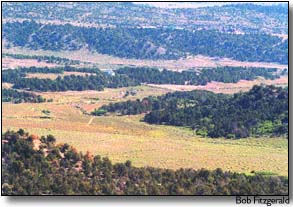|
August 28, 2001
By Jim Mimiaga Following an emotionally-charged public meeting, the Montezuma County Planning Commission rejected a proposal for a troubled-youth wilderness camp on land east of the entrance to Mesa Verde National Park. The commission voted to send the request for a high-impact permit to a public hearing in front of the county commission, but recommended it be denied because of neighborsí concerns about safety, the centerís incompatibility with surrounding residential use, and the lack of adequate access to the 47-acre property. The directors of the ASPIRE program, Scot Davis and Lillian Ramey, explained that the privately-funded outdoor school accepts teens with behavioral problems, but screens out violent applicants with extensive criminal records. "We turn away the scary ones ó violent or sex offenders," said Ramey in response to residentsí fears about a criminal element threatening their neighborhood. Clients are not court-ordered, and must have parental cooperation, she said. Under the program, teens ranging in age from 13 to 18 attend group and one-on-one therapy in an atmosphere of physical challenge and rustic living. The program is designed to build individual strengths and encourage personal growth, teamwork and education, according to ASPIRE literature. Up to 12 students enrolled by their parents would participate in 15-week courses at a cost of $15,000 per student. A house on the property would be the main facility, and two cabins would be built for student sleeping quarters. A ropes course would be installed, and numerous field trips would be taken, such as rafting, camping and archaeology expeditions. Ramey said an emphasis would be on education and behavior modification in outdoor settings. "Itís not just for kids with trouble, the program is also for those that do not function well in traditional schools," she said. The three directors have backgounds and degrees in mental health and experience with outdoor education and so-called experiential learning techniques. The privately-funded commercial facility was earmarked for a high-impact permit by the planning department because it would potentially exceed threshold standards, although ASPIRE officials say they do not expect to exceed any. An audience of 20 voiced both support for and opposition to the youth camp. Neighbors worried about their safety if a youth escaped. "Mostly my concerns are the safety of my family if a student gets away," said Ted Neergaard, a neighbor. Neergaard holds the 40-foot wide easement going to the ASPIRE property, and did not want the commercial impacts of the business on the road. "It was designed for two houses, now there are four, plus this proposal," he said. "Iím responsible for maintaining that road." According to the county land-use code, high-impact-permit holders must provide road access that meets county specifications, which require a 60-foot right-of-way and a 24-foot-wide road with shoulders. Neegaard said that because of a steep draw, there is no room to expand the easement, nor does he want to give up more of his property to do it. Ramey said she felt the road was adequate, and that traffic would not exceed threshold standards, as the students would travel back and forth in a van. A staff of three would reside at the house with the possibility of up to four more counselors being hired. Opponents cited language in the land-use code that states planning decisions are based on "the health, safety and welfare" of the community. But supporters said that same argument could be interpreted in favor of the youth facility. "It would be an asset to the health of the community," Loschert said. "Iím tired of hearing young people characterized as criminals just because they are struggling through the teen years." "You canít guarantee that there will not be a problem with these types of kids. I know, I work with them," said opponent Angela Harper. "I have kids that play on my property and I do not want to have to tell their parents that this is nearby." Ramey said that the clients are carefully screened and would be constantly monitored by staff. Procedures involving contacting law enforcement and local mental-health hotlines are in place if there is a walk-away. "You say they are watched all the time, even when theyíre sleeping?" asked one man. "That is when many of us snuck out when we were kids." Planning-commission chair Dudley Millard cut off the debate when Wild Wild Rest owner Ray McCarty read a letter concerning his fears. "You donít retrain a rabid dog by giving it a bone. You give it a bullet. I donít care who feels psychologically sorry for it," McCarty, formerly with the Los Angeles Police department, read. "If you encounter a human with a mental disorders of any kind, the outcome of the meeting could be very disheartening, as Jeffrey Dahmersí victims would testify if they could." Dahmer, a psychopath who lured people into his Milwaukee apartment, murdered 13 and then consumed some of the bodies. "Does anyone have anything constructive to add?" Millard said when McCarty finished. "Iím hearing a lot of garbage and innuendo and I do not think that is what these kid programs are about." Supporters stated that intervention programs like the one proposed by ASPIRE work to prevent such atrocities as the Columbine massacre by dealing with problems early in a teenagerís life. While supportive of the type of program, the planning commissioners said the facility would not be compatible with residential homes nearby and that a more adequate easement was needed for fire, police and commercial access. The matter now will go to the county commissioners. |
||
|
Copyright © 2001 the Cortez Journal.
All rights reserved. |
